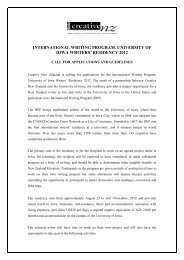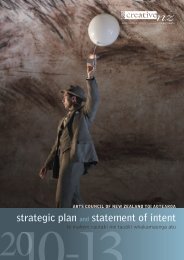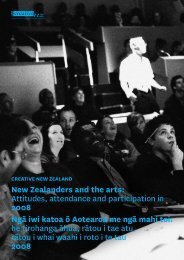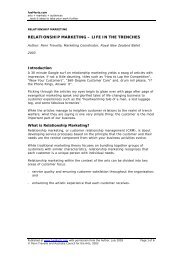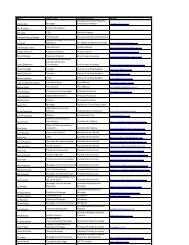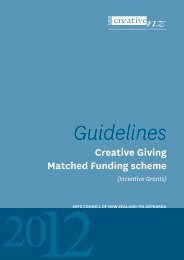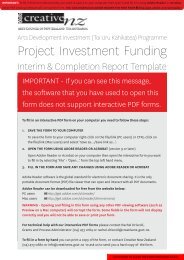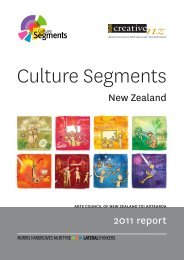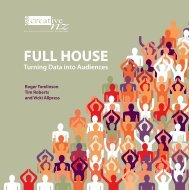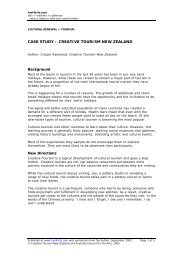Download PDF 626 KB - Creative New Zealand
Download PDF 626 KB - Creative New Zealand
Download PDF 626 KB - Creative New Zealand
You also want an ePaper? Increase the reach of your titles
YUMPU automatically turns print PDFs into web optimized ePapers that Google loves.
DAY ONE: INTERACTIVITY<br />
Keynote Address<br />
Andy McKim, Artistic Director, Theatre Passe Muraille<br />
Engaging Our Community: Building the bridge while walking on it<br />
Theatre Passe Muraille (TPM) is the oldest theatre in Canada for the development of new<br />
work. Andy McKim took over as artistic director in 2007 on the anniversary of its fourth<br />
decade. He has revitalised the theatre in part because he focused on the question of how to<br />
engage with the artists and the public in his community. In his address he spoke about<br />
“history, values and acts of engagement”.<br />
TPM was founded in an environment, fuelled by the centenary of the foundation of Canada,<br />
that was asking what it meant to be Canadian. Toronto was a traditional, homogeneous<br />
Anglo-Saxon city with little evidence of the many decades on immigration that had been<br />
taking place. “We now live in an exciting intercultural mash-up” – the new face of Canada,<br />
said McKim. TPM values this diverse audience – and with 550 new Canadian plays to its<br />
credit, reflects many of the community’s stories in its repertoire.<br />
It was not always such a rosy picture. Four years ago, TPM was almost bankrupt and had<br />
lost its way. TPM’s founder, director and playwright Jim Garrard, had stressed the<br />
importance of not only creating new works that reflected Canadian experience, but of<br />
developing new models through which to engage with audiences. Garrard’s successor Paul<br />
Thompson developed The Farm Show, now a staple of Canadian theatre. It epitomised the<br />
ethos of TPM in which actors go into communities and meet an audience who don’t share<br />
the same values. By interacting, each develops different viewpoints.<br />
By 2007, TPM needed to reconnect with these founding principles. TPM is devoted to<br />
encouraging meaningful engagement between its communities: artists, staff, audiences,<br />
neighbourhoods and supporters. It holds complementary values: supporting and presenting<br />
new artists and companies; collaborative and multidisciplinary work; and presenting<br />
alternative and marginalised voices.<br />
McKim recognised that TPM had become abstracted from it audience. “We were in essence<br />
broadcasting to the audience through a megaphone. Either you liked what we did – or not.<br />
But we didn’t seek out their opinion. We were the artistic decision-makers – why would we<br />
need to directly involve the community in our activities?”<br />
“There is no doubt we have undervalued our community’s ability to be creative, articulate<br />
and passionate about the arts,” he said. “But people are engaging in the arts all the time,<br />
without our guidance. If we give them more room to participate, we may see a rise in our<br />
institutions’ relevance and attendance.”<br />
TPM has now restructured so that its value-based, non-hierarchical organisational model<br />
reflects the artistic process, and its vision and values. McKim has removed the silos “that<br />
create job segregation” and re-designated staff roles so they are all part of a management<br />
team moving TPM forward collaboratively. All are called associate producers. All accept<br />
responsibility for the marketing, promotion and ongoing development of the theatre. In



